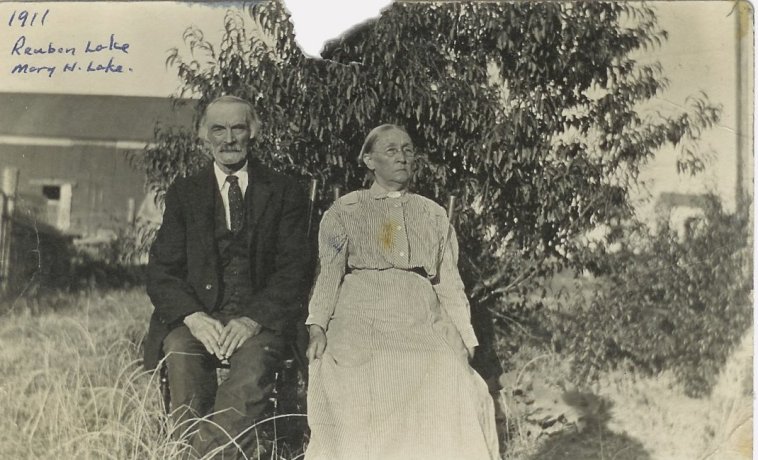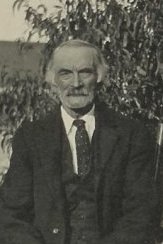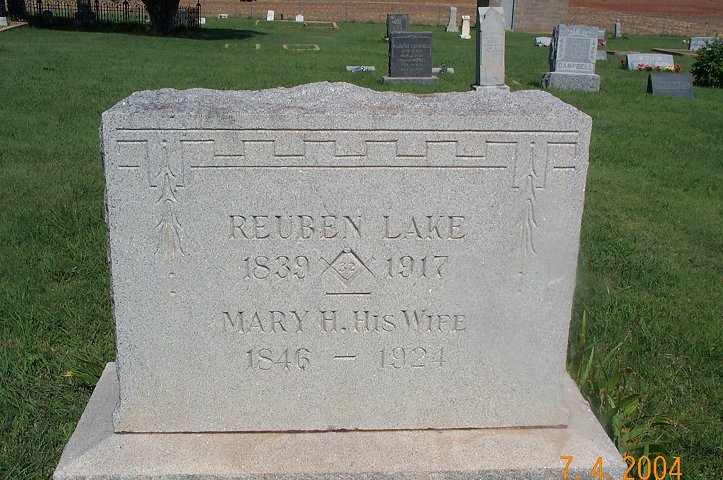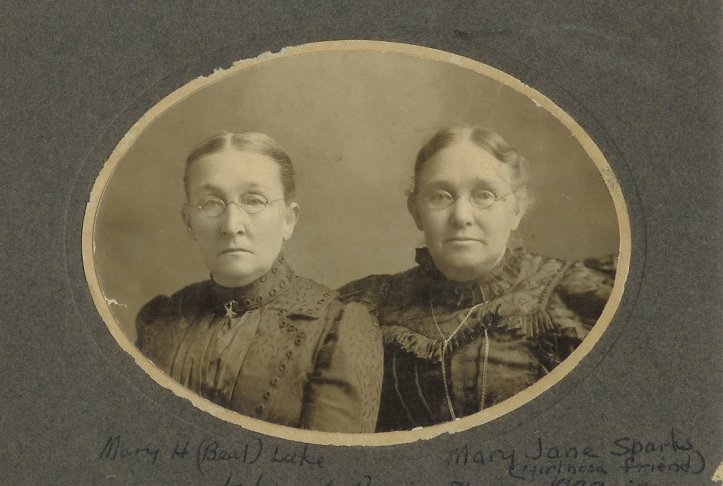
Barber County Kansas

 |
Barber County Kansas |
 |

Reuben and Mary (Beal) Lake, 1911, Lake City, Barber County,
Kansas.
Photo courtesy of Carol (Lake) Rogers..
Reuben Lake, one of the oldest, if not the oldest, Barber county citizens, in point of residence, passed away at Lake City Friday, November 2nd, after a week's illness.The passing of this venerable citizen brings profound sorrow to many hearts, especially to those who were his friends in the years that lie in the past - who shared with him the untold hardships of the plains, who knew of his indefatigable courage, optimism and cheerfulness under all circumstances, and his loyalty to his friends day by day - these friends and companions are deeply affected by his death and will sacredly remember his virtues until they too, shall be ushered into "that borne from which no traveler returns."
"Uncle Reub" came to Barber county in 1872 and founded the little town which bears his name. In his prime he was one of the early-day developers and was identified with every enterprise as a leader in all public affairs. This paper has not complete data of his marvelous activities and cannot do justice to his useful life, but a friend of many years who knew him intimately will furnish a complete obituary for next week's publication.
The Index's representative at Lake City furnishes the following account of the death and funeral:
"Reuben Lake died at his home in Lake City, of lagrippe, Friday, Nov. 2nd, aged 77 years, 10 months and 28 days. Funeral services were held at the M. E. church Sunday morning, Rev. J. P. Woods of Sun City preaching the sermon, assisted by Rev. William Clapper, pastor at Lake City. The Masons, of which order he was a member, had charge of the services at the grave in the Lake City cemetery.
"Mr. Lake leaves a widow, a son, Riley Lake, and a daughter, Mrs. F. L. Gordon, of Medford, Okla., and three grandchildren. Three sisters and two brothers also survive him, but were unable to attend the funeral. That the friends of the family sympathize with them was shown by the large number of people who gathered to pay their last tribute of respect to their old friend and comrade, it being the largest funeral ever witnessed in Lake City. And it will be long before we shall be accustomed to the absence of 'Uncle Reub' along the streets of Lake City.
"To those relatives whom he left we will say:
"There is a day of sunny rest,
For every dark and troubled night;
And grief may bide an evening guest,
But joy will come with early light.'
For forty-four years Reuben Lake was the most familiar figure about our little city which he founded; and it is hard for his friends to realize that they will see him in his accustomed place no more. He was in the prime of manhood when on that April day of 1873 he came upon the beautiful valley which he selected as a favorable place for a home for himself and others. Many discouragement's have come to Lake City since then, but its founder kept faith in it and fostered it with his means until he was rewarded by seeing it assured of permanence. Now that he has been called to rest, it is highly fitting that he sleeps there on that slope which overlooks the town which he nurtured for nearly half a century.Reuben Lake was born near Toronto, Canada, December 6, 1939, died at Lake City, Kansas, November 2, 1917. In 1858 he came with his parents to the United States and settled in Adams county, Illinois. He was married to Mary H. Beal, July 4, 1861, at Ouincy, Illinois. To this union were born six children, but two of whom survive to maturity; Riley Lake, Barber county's popular county commissioner; and Mrs. Frank L. Gordon, of Medford, Oklahoma. Besides these children, the deceased leaves the following near relatives; his wife, three grandchildren, three sisters and two brothers. The latter are James Lake of Detroit, Michigan; and Fred Lake if Danville, Illinois. The sisters are Mrs. Elizabeth Heuer and Mrs. Mary Shaffer of Quincy, Illinois; and Mrs. Lydia Cummings of Arcola, Illinois. The grandchildren are Russell, Dan and Inez, the children of Riley Lake. The first named now has charge of his father's large farm at Lake City and the latter two are attending the State Agricultural college at Manhattan.
The subject of this sketch joined the Federal Army in 1863, enlisting with the 78th Illinois. In 1865 he moved to Erie, Kansas, where he remained till 1873, when he moved to the place which has since borne his name. He was the first Sheriff of Barber county; and he served as county commissioner two terms. He has been engaged in the mercantile business at Lake City almost continuously since 1878. Though his circumstances were such that he might many years ago have quit an active business life, his superabundant energy, which remained unabated despite advancing years, could find, it seemed, no fitting outlet except through dealing with his fellows. However, he loved the game of business above the mere gain, and it was fitting that the end should come while the zest of the game was upon him. When the call came he had charge of one of the largest stocks of merchandise in the county; for, with that school-boy enthusiasm which he retained to the last, he continued to scorn a life of leisure.
One of the peculiar characteristics of this man gifted with so much energy was ability to turn his energy into money. He has often told the writer that he could make money at anything which he might undertake. Yet with this ability, he never became greedy for gain; rather, he was somewhat careless in conserving the fruits of his energies. In the early days he built up an immense business at Lake City and accumulated a fortune in goods and lands. When the hard years came through injudicious crediting, and through signing notes for others, the fortune was lost. And there are autocrats now walking the earth who owe their wealth in part to their taking advantage of this man who insisted on finding only honesty in men. But he was no man to harbor resentment against those who betrayed his confidence or otherwise did him wrong. Instead he worked out for himself a philosophy as sound as any that Emerson ever set forth; he insisted that if we leave to God those who do us wrong, he will punish them; but if we undertake to get revenge, God will have nothing to do with it.
Aside from the loss of wealth in the ways mentioned above, he was unusually unfortunate in his losses by fire, having lost at different times property worth many thousands of dollars. Too, in late years through his old habits of crediting, and through the dishonesty of others whom he trusted, he lost immensely. Yet, with all these reverses, he came to the last with enough and to spare of this world's goods.
Mr. Lake belonged to the following secret orders: A. F & A. M., O. E. S., Shrine, I. O. O. F. and K. P. But, owing to feelings which grew out of misunderstandings with some of his fellow lodge men, he had not for years taken active part in the lodge work of his home town. However, he never lost his enthusiasm for attending big lodge functions elsewhere, and he stood high in the esteem of his brother lodge man.
What is true of him in the matter of the lodges is true also as regard the church. Though he had been a church member for many years, he was not a regular attendant of the church. This was in part due to old hurts which his sensitive nature could not overcome; but it was due mostly to the fact that his peculiar nature never allowed him to conform entirely to the conventions of orthodox religion. It is always for man of his mold to remain hedged in by man-made conventions; for he was a man of original ideas, a man with a mind of his own.
He was an inveterate reader of the Bible, and he had learned to look to that book for the comfort which the average christian finds only in his church activities. After the business hours of the day it was his custom often to sit far into the night reading the book which he knew and loved so well. So steeped was he in biblical lore that he would seldom speak to one for more than a few moments without making some application of its truth. These facts are not given in an attempt to justify his attitude toward the church, nor are they given with the intention of conveying the idea that he had no faults.
As a friend who knew his hatred for sham and pretense, the writer would take the advantage of him by claiming for him what he never professed for himself. He had his peculiar shortcomings, and he made no pretense of faultlessness; yet those who knew him best, know that he also had his sterling virtues. And in the mind of him who records these facts the most enduring memory of this departed friend is that of the reverend old man bowed at his family alter humbly and earnestly petitioning the Throne of Mercy for the richest blessings to all mankind.
"Uncle Reub," as he was familiarly called, though he seemed not old, had lived well beyond his allotted years of man; and the friends left lonely in his absence must admit that nature was not unkind to him. The children and grandchildren, with their active duties of life, must in time become reconciled to this inevitable sorrow. But for her who walked with him for fifty-six years it will be hard to take up the broken threads of life. It is difficult to readjust the workings of a lifetime, and especially is true of her whose generous nature never gave but of its best. Yet in this, her darkest hour, she will look to Him who can comfort her and keep her, and keep us all, in the blessed assurance that in a little while, somewhere out there, we shall be reunited with those who go from us.

Reuben Lake was born in 1839 in Canada, moving to Illinois with his family when he was 16, and after service with the Union Army, emigrating to Mission near Erie in eastern Kansas, but later on to Barber County.In April of 1873, together with ten companions, which included a younger brother, Frederick, as well as his son Riley, he came to Barber County. There he erected a sawmill to obtain lumber for the houses which were built. The families came in August but returned to Mission because of an Indian scare, immediately turning around as soon as the scare was over.
From then on the history of Reuben Lake and that of Lake City was inevitably mixed. Reuben, in the fall of 1873, was appointed the first postmaster of Lake City, mail being brought from Medicine Lodge by horseback. The first post office, along with a store, was in Reuben's home.
In the 1880's he built a large, two-story building of locally fired soft brick, still standing, which contained a large room for a store, several store rooms, as well as an opera room. In one of the rooms the Lake City Prairie Dog was published weekly. Several homes as well as a schoolhouse were built of the same native brick. When the county was organized he was elected sheriff. He also served as County Commissioner. By the late 1880's he had built a large building for a hardware and a mortuary, a furniture store, a wagon maker's establishment, a wind-driven grist mill as well as a two-story, 20-room hotel. The hotel was operated for the most part by his wife, Mary, until it burned in 1897. Reuben also promoted the first bridge across the Medicine River south of Lake City enabling the people in the south of the county to get to town.
He made the run to the "Strip" in 1893 along with his daughter, Irene, securing a half section of land near Medford, Oklahoma, which he farmed until returned to Lake City in 1904. At the time of the run many Barber County residents also left, many on securing a claim moving their houses from Kansas. Reuben, on returning, built eight rental houses preparing for the building of the railroad. He also remodeled a large store building, erected a residence, and started a general store which he ran until his death in 1917. At various times he had stores in Coats, Sun City, and Aetna as well.
Riley Lake, his son, came to Barber County in 1873 when but ten years old, driving a wagon for his father. In the early 1880's he brought horses from San Antonio to Lake City. In 1884 he started a stage line between Medicine Lodge and Coldwater offering daily service to passengers and mail. Later he had a stage route between Syracuse and Richfield, and after the strip opened a route out of Guthrie, Oklahoma.
Riley Lake was County Commissioner for over twenty years. He operated a large farm and ranch around and south of Lake City until his death in 1934. In 1895 he was married to Pearl Tacket, who died in 1948.
Excerpt from "A Frontier Court"
in When Kansas Was Young
by Thomas Allen McNeal, pages 4-5.It fell to Judge Brown to hold the first term of court in the newly organized county of Barber. Court house there was none, although the thieves who organized the county had incurred sufficient debt, ostensibly for that purpose, to have built a fine temple of justice. The opening term was held, I think, in a schoolhouse which had just been completed. The sheriff was a unique character by the name of Reuben Lake. With great dignity and solemnity the new judge directed the sheriff to open court. Reuben had somewhere learned the usual formula for opening court, and varied it with some observations of his own. In stentorian voice he announced to the assembled crowd:
"Hear ye, hear ye; the honorable district court for Barber County is now in session. All you blank, blank sons of blank who have business in this court will lay off your guns and come to the front, and all you blank, blank sons of blank who have no business in this court will lay off your guns and keep __________ quiet."
Mary H. Lake, daughter of William Beal, was born in Cape Grando county, Missouri, February 4, 1845, died at Lake City, Kansas, August 3 1924, aged 79 years, five months, and 29 days. She was married to Reuben Lake at Quincy, Ill., July 4, 1861. Six children were born to this union, four of whom died in infancy. The oldest child, Riley Lake, of Lake City, and Mrs. F. L. Gordon, of Medford, one sister. They are James Beal of Keokuk Falls, Okla., Robert Beal of Waynoka, Okla,, and Mrs. Rhoda Pettijohn, of Portland, Oregon. She also leaves three grandchildren and two great grandchildren.She came with her family to Neosho county, Kansas in the spring of 1865. From there to Barber county in 1873, where her husband promoted a part of the town of Lake City, where she has since lived.
He husband preceded her to the grave, November 2, 1917. She united with the Baptist church thirty years ago. She was a member of the Eastern Star of Lake City chapter No. 269, also a member of the Rebekah Lodge of Sun City, Kansas.
Funeral services were held in the Methodist church Monday afternoon Aug. 4, conducted by Rev. C. W. Owens, of Sun City, an old friend of the family. The Eastern Star, Lorraine Chapter of Medicine Lodge were in charge. Interment followed in the Lake City cemetery, and she sleeps beside her husband overlooking the little city that she loved so well.
Mrs. Lake was not an ordinary woman. She was like the pioneer woman of old, full of courage and hope. There was nothing too hard for her to do or undertake and in truth one could well be called a pioneer in those days. Although she was a woman of multi-fold activities, of cares and responsibilities, she yet found time to be a mother to others beside her own. Fredrick P. Lake her husband's brother came to them at the age of 6 years and remained until he married. Another brother, Peleg Lake, also was with them until grown to manhood and when his two children , Lizzie and Fred Lake needed a mother it was Aunt Mary who cared for them and her young sister Sarah Beal, afterwards Mrs. James Garten, lived with her until married.
Before she was taken to the church last Monday afternoon, a number of ladies from out of town came in and wept over her, kissed her, saying, "She was always a mother to me." What greater honor could a woman have than being a mother to so many.
Always since her residence here, Mrs. Lake has been identified with the life of Lake City, interested in whatever would be of service to the town, and she loved attractive homes set in shrubbery and trees, which you can tell by the magnificent cottonwood tree that she set out many years ago.
But the years have been long, and the heart and feet grow weary, and the blessed Christ looking down whispered, you have live your life well and have earned your rest, and lo: the pain was gone, and the perfect peace of God was with her. And to the bereaved, words are of no avail now. Only time can heal the grief, but believe she will be forever with you in spirit watching and loving you as of old.

Gravestone for Reuben and Mary Lake, Lake City Cemetery,
Barber County, Kansas.
Photo by Kim Fowles.

Mary H. (Beal) Lake with Mary Jane Sparks (childhood friends)
Photo courtesy of Carol (Lake Rogers).
Also see:
Irena B. Gordon, of Reuben Lake.
Riley Lake, son of Reuben Lake.
Russell Lake, grandson of Reuben Lake.
Lake City Plot Map, Barber County, Kansas
From Standard Atlas of Barber County, Kansas, 1905. Courtesy of Kim Fowles.Lake City Cemetery, Lake City, Kansas.
"A Frontier Court", from When Kansas Was Young by Thomas A. McNeal.
Thanks to Shirley Brier for finding, transcribing and contributing the above news article and obituaries to this web site, to Carol (Lake) Rogers for the portrait photos and to Kim Fowles for the gravestone photograph!